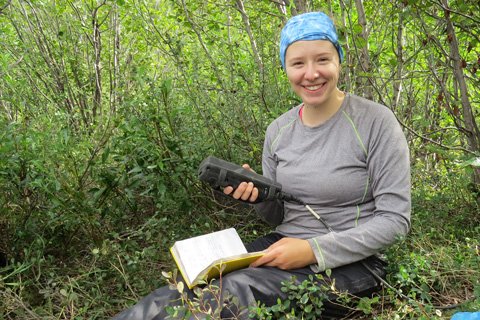- The Research Office
- news
- About the Research Office
- Calendar, Training and Events
- Faculty/Staff Resources
- Research Facilities and Resources
- Research Centers
- Student Research/Funding Opportunities
- Professional Development, Collaboration Resources and Community Engagement
- Regulatory Compliance
- Technology, Commercialization and Economic Development
- Frequently Needed Information
- Give to the Research Office
- GDPR Privacy Notice
- Contact Us
- Highlights
Biology student conducts research in Alaska
 |
| Biology major and Honors College student Rachel Voight conducts research in Alaska that will help in the understanding of global climate change. |
The project seeks to determine whether ecological experiments conducted on smaller spatial scales yield accurate data on ecosystem rates of algae and microbial production and consumption across various ecosystems. The SCALER – or Scale, Consumer, and Lotic Ecosystem Rates project – is funded through the National Science Foundation Macrosystems Biology program and is one of only a few studies investigating how small-scale ecological experiments can be used to understand the overall structure and function of different ecosystems.
“The purpose of this widespread experiment is to learn what happens when you scale an experiment down from a 500-meter stream to a simulated stream in a 300-square-cenemeter chamber,” said Voight, a senior biology major and Honors College member. “The project will provide valuable insight to ecologists about what happens when you scale experiments to different sizes. Being able to conduct small-scale experiments is a huge benefit for researchers because it often utilizes less time and resources than large-scale projects.”
Voight discovered the opportunity while searching online for summer research internships for undergraduate students. She was selected for the position from among 40 applicants nationwide and traveled to the University of Alaska-Fairbanks to serve as a summer research technician.
“The majority of the time I was working at field sites located in the boreal forest of the Caribou-Poker Creek Research Watersheds, about 25 miles north of Fairbanks,” Voight said. “We regularly measured stream discharge at different streams in the watershed and sampled the stream bed to measure photosynthesis and quantify the amount of organic matter in streams. I also assisted in executing various field experiments to determine the stream ecosystem's ability to use nutrients at both large and small scales.”
Along with these efforts, Voight worked on a separate project in which she assembled a probe that measures dissolved carbon dioxide levels in streams. By tracking the daily carbon dioxide flux, the probe provides information on photosynthesis and the biogeochemical makeup of a stream. Voight explained that this work is the start of a larger project examining the relationship between carbon dioxide levels and thawing permafrost (frozen ground) in the Caribou-Poker Creek Research Watersheds.
“Through the global carbon cycle, thawing permafrost is linked to increased levels of carbon dioxide in the atmosphere,” Voight explained. “Higher amounts of carbon dioxide in the atmosphere have contributed to global climate change. Studying and quantifying what is happening in the Caribou-Poker Creek Research Watersheds will increase our understanding of how thawing permafrost impacts climate change.”
Voight said her OU education prepared her to work in a high-level research setting. The experience she gained while taking part in the OU’s Summer Research Program in 2013 was especially vital to her scholarly development. She conducted research in the Biology department's Aquatic Ecology Lab, with guidance from Dr. Scott Tiegs, assistant professor of biological sciences.
“The Summer Research Program in Biological Sciences and Chemistry continues to attract some of our best students, and provides them quality research experiences," said Dr. Tiegs. “The fact that Rachel had a considerable amount of research experience when she applied for the position in Alaska undoubtedly made her a stronger candidate.”
Voight is on track to graduate this spring and plans to pursue her master's degree in biology at Oakland.
“The research in Alaska was a great complement to my studies at OU,” Voight said. “I was able to apply what I learned from the classroom in a new environment. It was a unique experience to see how other laboratories operate and how researchers collaborate on projects.”
For more information on programs and opportunities in Oakland's Department of Biological Sciences, visit the website at oakland.edu/biology.
